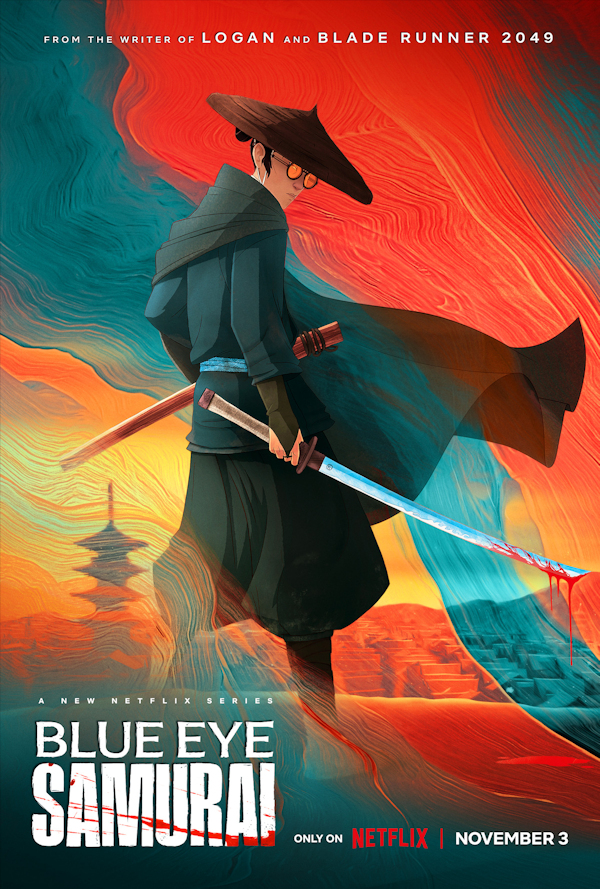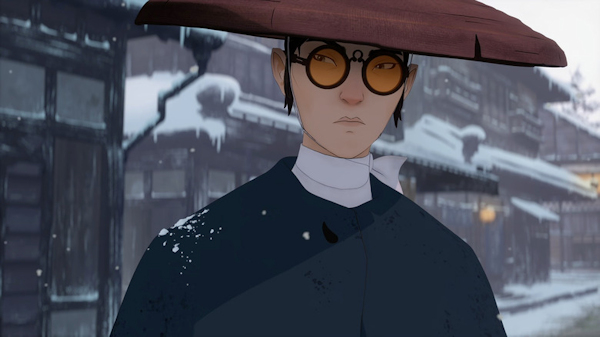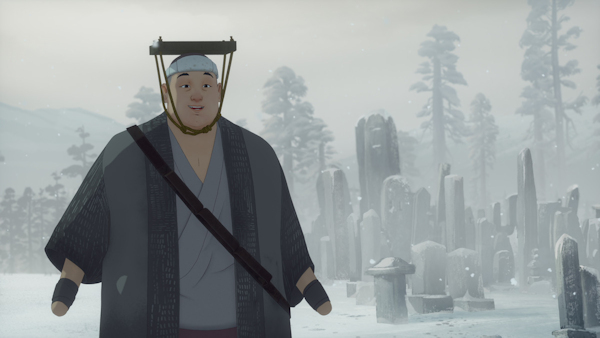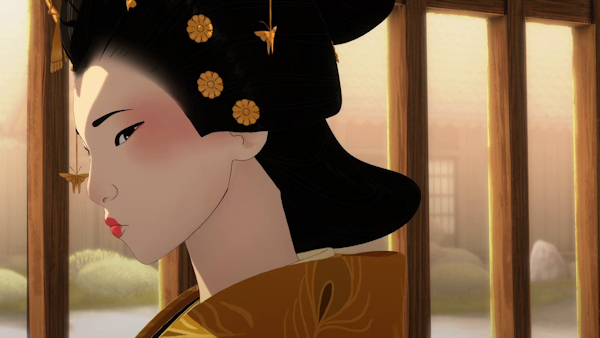“Mulan meets Kill Bill”
 I enjoyed the Blue Eye Samurai much as I enjoyed Solo. Both tell engrossing stories, with complex plots, luscious visuals, and compelling characters; but suffer for being part of an existing setting. For Solo, that is of course the Star Wars universe, and I love watching it as long as I pretend it’s not a movie about the iconic Han Solo. Blue Eye Samurai suffers from a nearly equally high bar for setting: the history of mid-1600s Japan.
I enjoyed the Blue Eye Samurai much as I enjoyed Solo. Both tell engrossing stories, with complex plots, luscious visuals, and compelling characters; but suffer for being part of an existing setting. For Solo, that is of course the Star Wars universe, and I love watching it as long as I pretend it’s not a movie about the iconic Han Solo. Blue Eye Samurai suffers from a nearly equally high bar for setting: the history of mid-1600s Japan.
It follows Mizu, a mixed-race swordswoman on a mission of vengeance to kill her European father. Like Mulan, she disguises herself as a man in order to move through the world in the identity of a samurai. As we follow her tale of revenge, we also see flashbacks to her backstory as a bullied social outcast.
She’s an anti-hero, her decisions yanked and pulled between her moral compass and a vengeance, which requires eschewing all morality. At times, we applaud her for helping the downtrodden, while on other occasions, we are appalled by her turning her back on them in order to forward with her revenge.

Her hardness is tempered by Ringo, voiced by the affable Masi Oka of the Heroes TV series. Like Hiro of that show, Ringo has lofty goals and a strong sense of right and wrong. Lacking hands, yet getting by with ingenious prosthetics, he’s a misfit looking for where he fits into an unforgiving world.

Their paths intersect with Akemi, the daughter of a lord who’s clawed his way up from peasant to councilor to Shogun. Masterfully voiced by the Disney Channel-turned-Home Alone-bride Brenda Song, Akemi has been given a free reign in a culture that otherwise has strict roles for women. She’s been tutored by her father’s advisor Seki, whose distinctive tone and inflection is immediately evident as George Takei. (While most want Morgan Freeman to narrative their biography, I’d choose Takei.) Wanting to escape her impending political marriage to the Shogun’s son, she escapes to search for her true love.

With all these fascinating characters driven by different goals, their twisting paths weave an intricate, bingeable story. However, it’s a narrative flawed by historical, cultural, and technical inaccuracies. Akin to Kill Bill, it’s a tale of revenge that ignores the constraints of historical fact in favor of wildly popular tropes and misconceptions:
- Mannerisms and language whiplash between modern colloquial and fortune cookie aphorisms, sometimes making the characters feel out of place in stunning, accurate visuals.
- Peasants have become samurai in the show, even though social mobility was near impossible at the time. As such, the beautifully engineered plot twist would’ve been impossible.
- It’s duel after duel, yet it’s set in an era of peace, when Samurai had become more bureaucrats than swordsmen, and duels were mostly outlawed.
- When the villain of the story besieges the capital with firearms, his sharpshooters take out archers—when in fact, the Tokugawa Shogunate maintained a corps of riflemen, despite those guns of that era being wildly inaccurate compared to the bow.
- Much of the depiction of sword forging is correct, one of the main features is Mizu’s meteorite sword—an iron type so full of impurities, they actually make for poor weapons.
As such, Blue Eye Samurai would’ve benefited from better historical research. It would’ve probably worked better being set in a Japanese-inspired second world (though without the gross misconceptions of Japan we see in Jay Kristoff’s Stormdancer series). If you pretend this is the case, then it’s a brilliant story.
For a story of a real-life female samurai, who was also a gunsmith and a sharpshooter (albeit 200 years after the Blue Eyed Samurai setting), check out the NHK Taiga Drama, Yae no sakura.
Have you seen Blue Eye Samurai? What did you think of it? Let us know in the comments!


